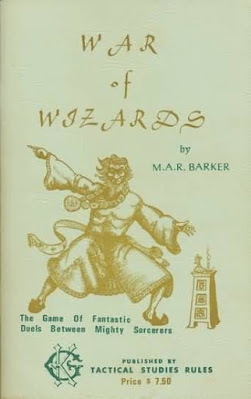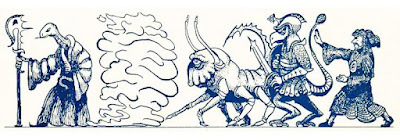Retrospective: War of Wizards
 Reading issue #8 of White Dwarf in preparation for this week's post, I was reminded of the existence of War of Wizards, published by TSR in 1975. Appearing in May 1975, the game is fascinating on a number of levels, starting with the fact that, because of its publication date, it's the first appearance of the world of Tékumel in print. Remember that Empire of the Petal Throne, which is usually taken to be the world's introduction to the setting, wouldn't appear for another few months and understandably so. EPT is a full-fledged roleplaying game, featuring a 114-page rulebook and multiple maps, while War of Wizards is simply a "game of fantastic duels between mighty sorcerers." In terms of content, depth, and presentation, there's not much commonality between the two – and, yet, it's precisely for that reason that I think War of Wizards is worthy of discussion.
Reading issue #8 of White Dwarf in preparation for this week's post, I was reminded of the existence of War of Wizards, published by TSR in 1975. Appearing in May 1975, the game is fascinating on a number of levels, starting with the fact that, because of its publication date, it's the first appearance of the world of Tékumel in print. Remember that Empire of the Petal Throne, which is usually taken to be the world's introduction to the setting, wouldn't appear for another few months and understandably so. EPT is a full-fledged roleplaying game, featuring a 114-page rulebook and multiple maps, while War of Wizards is simply a "game of fantastic duels between mighty sorcerers." In terms of content, depth, and presentation, there's not much commonality between the two – and, yet, it's precisely for that reason that I think War of Wizards is worthy of discussion.Before getting into the specifics of the game itself, I want to devote a little time to its presentation of Tékumel. As most readers probably already know, M.A.R. Barker first began work on the earliest version of Tékumel when he was still a child. Upon that foundation, he then further developed the setting in multiple phases, from the 1940s till the time when was introduced to Dungeons & Dragons in 1974. I say "versions," because, during each phase of development, Barker's conception of Tékumel changed, sometimes in small ways and sometimes in big ones. An example of a big change, for example, is the use of the terms "good" and "evil" to describe deities who would later be associated with "stability" and "change," respectively. In War of Wizards, though, we see neither of these formulations. Instead, Barker calls the gods the "Lords of Glory" and the "Rulers of Shadow." Purely from a historical perspective, this is interesting to me, as it suggests the degree to which the setting was still in flux within Barker's mind. Rather than emerging fully formed, like Athena from the head of Zeus, Tékumel grew over time and through play (as all good RPG settings do).
War of Wizards is a two-player game that models a trial by combat between two spellcasters, whether as part of a match in one of the Hirilákte arenas found in most large Tsolyáni cities or as part of a more personal duel. Regardless of the ostensible reason, each player can choose to play either a priest or a sorcerer. The former may wear armor, while the latter have access to a wider array of offensive spells. These combatants are characters each possessing three ability scores rated from 2–200 (achieved by rolling percentile dice twice). The first of these, Physical Strength, functions primarily like hit points. The other two, Attack and Defense Strength, represent pools of points that can be used to power spells. Each spell in the game has a cost and characters can continue to cast spells so long as they have enough points in the appropriate ability score. In a pinch, it's possible to shift points from Physical Strength to the other two scores, but doing so weakens the character, making it easier for his opponent to defeat him.
The game was released in two versions: the first was unboxed and the second boxed. The boxed version included four metal miniatures, supplementing the cardboard counters that are included in both versions. Integral to play is a "board" consisting of 20 spaces that abstractly handle the distance between the two combatants and their spell effects. The board is quite attractive, since it features artwork by Barker along its edges. Here's an example of one section of the board:
 I only acquired a copy of War of Wizards fairly recently, so I've never had the chance to play it. Reading through the rules, it doesn't seem like it would be difficult to learn, though there does seem to be a lot of bookkeeping involved. Keeping track of all the points spent and lost, for example, might well be tedious – a common problem in "spell point" magic systems in my opinion – though, with time and practice, it might become less so. Even so, I find this game very intriguing, if only for its presentation of another version of Tékumel, one that's a little simpler and less exotic than that in later versions and yet still much more flavorful and different than the commonplace "vanilla" settings that dominated the hobby then and now.
I only acquired a copy of War of Wizards fairly recently, so I've never had the chance to play it. Reading through the rules, it doesn't seem like it would be difficult to learn, though there does seem to be a lot of bookkeeping involved. Keeping track of all the points spent and lost, for example, might well be tedious – a common problem in "spell point" magic systems in my opinion – though, with time and practice, it might become less so. Even so, I find this game very intriguing, if only for its presentation of another version of Tékumel, one that's a little simpler and less exotic than that in later versions and yet still much more flavorful and different than the commonplace "vanilla" settings that dominated the hobby then and now.
James Maliszewski's Blog
- James Maliszewski's profile
- 3 followers



